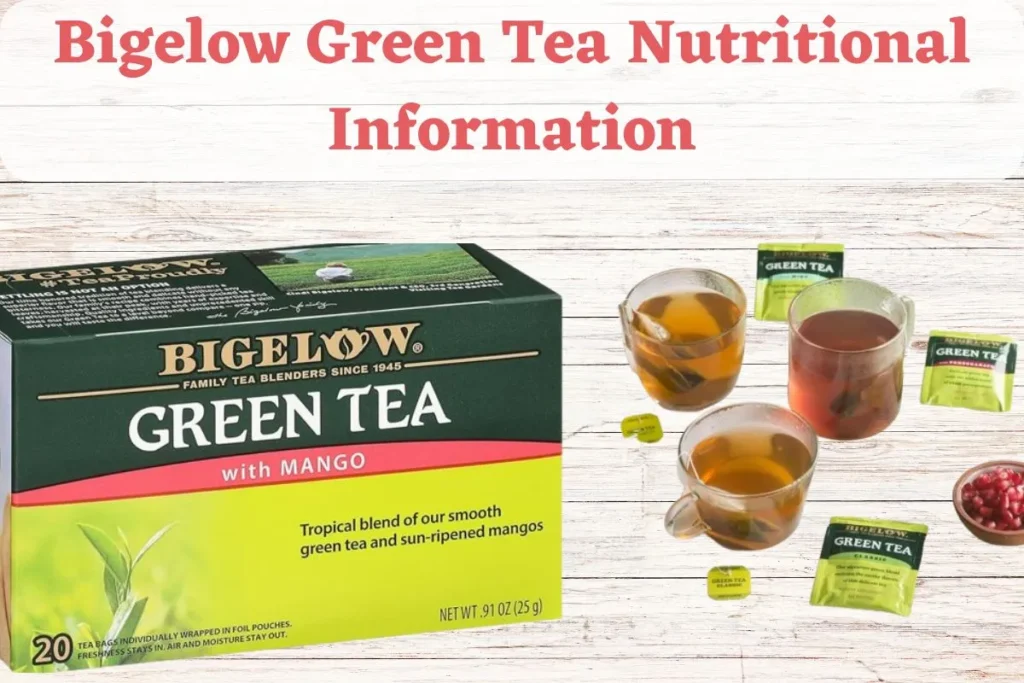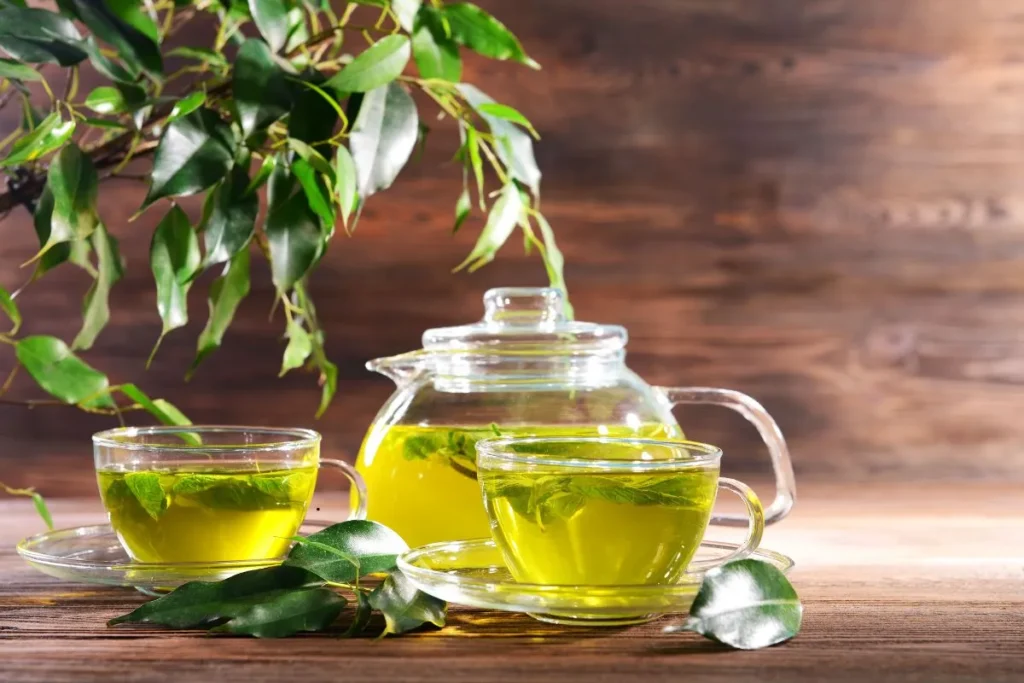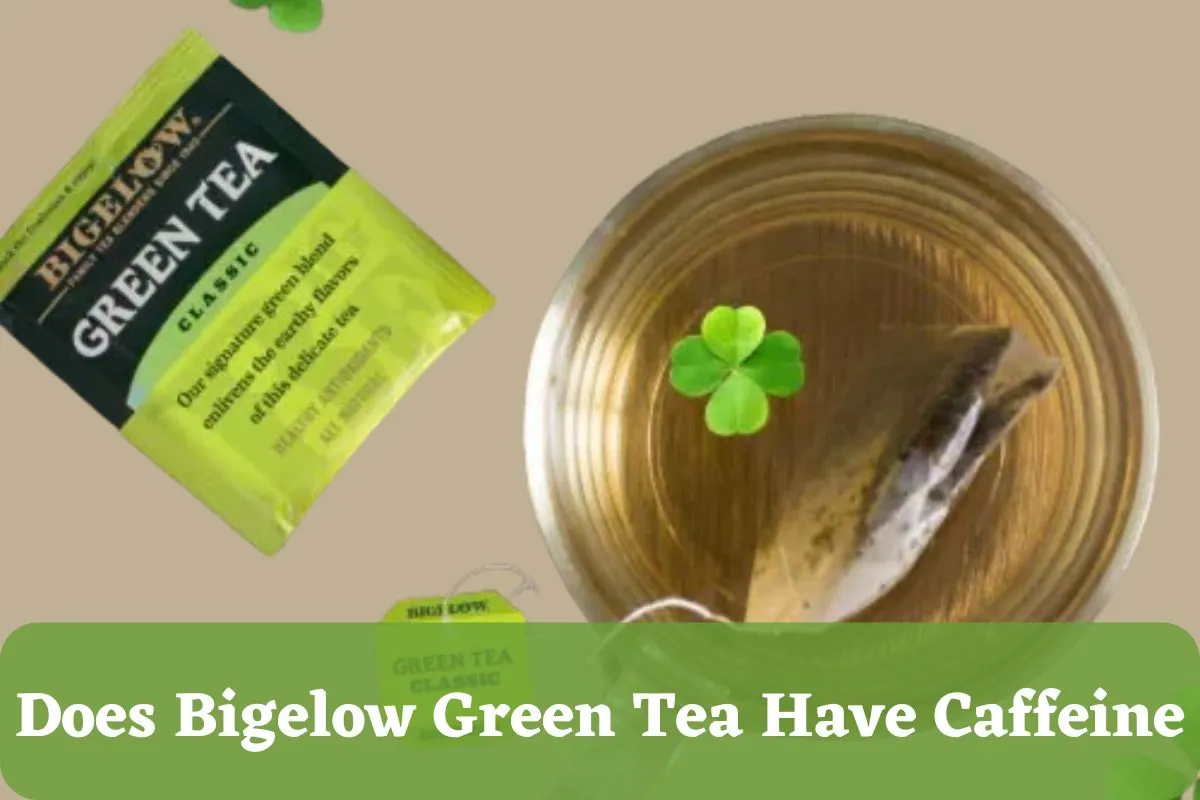Did you know that the very first specialty tea in the United States was created by a woman named Ruth Campbell Bigelow right in her own kitchen? Her creation, “Constant Comment”, sparked a passion for unique tea blends and led to the founding of the Bigelow Tea Company.
Today, Bigelow is a beloved brand, but just like their innovative flavored teas, even their classic green tea holds a bit of a surprise – it contains caffeine.
Importance of Knowing Caffeine Content in Bigelow Green Tea
Bigelow Green Tea is a popular line of teas derived from the leaves of the Camellia sinensis plant. With its reputation as a healthy beverage, green tea offers several potential benefits including antioxidant properties, possible immune system support, and potential contributions to weight management efforts.
While Bigelow prides itself on quality and a long history of creating delicious tea blends (dating back to founder Ruth Campbell Bigelow’s original “Constant Comment” recipe in 1945), it’s important to understand that green tea does contain caffeine.
Even though its caffeine content is lower than coffee, it’s still enough to impact individuals with caffeine sensitivities. Those who are pregnant, breastfeeding, have anxiety disorders, or have certain medical conditions may need to limit or avoid green tea consumption altogether. It’s always best to consult your doctor if you have concerns about caffeine intake and how it may interact with your health.
Does Bigelow Green Tea Have Caffeine?
Yes, Bigelow Green Tea is not entirely caffeine-free. Green tea, like black tea, white tea, and oolong tea, comes from the Camellia sinensis plant. This plant naturally produces caffeine.
Green tea typically has less caffeine than black tea or coffee. An 8-ounce cup of green tea generally contains about 25-50 milligrams of caffeine, compared to around 95 milligrams in coffee.
Bigelow also offers decaffeinated varieties of green tea. These have undergone a process to remove most of the caffeine, leaving a very minimal amount (usually around 1 to 8mg per cup).
To be sure, always check the specific Bigelow Green Tea product you’re interested in. It will clearly indicate if it’s a decaffeinated variety.
Several factors can influence the caffeine content in Bigelow Green Tea. Here are the key ones:
Tea Leaf Type
The specific variety of tea leaf within the Camellia sinensis plant plays a significant role. Younger leaves and buds, often used in premium teas, tend to have higher caffeine levels than older leaves. Additionally, the geographic origin of the tea leaves can influence caffeine content, as environmental factors and cultivation practices differ across regions.
Processing Methods
The way green tea leaves are processed significantly impacts caffeine levels.
- Steaming (commonly used in Japanese-style green tea) generally results in lower caffeine compared to other methods like pan-firing.
- The degree of oxidation the leaves undergo also plays a role. Longer oxidation times can slightly decrease caffeine content.
Brewing Factors
How you prepare your Bigelow Green Tea directly influences the caffeine you’ll consume:
Water Temperature:
Hotter water extracts more caffeine from the tea leaves. Using slightly cooler water (below boiling) will yield a less caffeinated cup.
Steep Time:
The longer you steep the tea, the higher the caffeine content will be. For a gentle, lower-caffeine brew, stick to shorter steep times.
Tea Quantity:
Using more tea leaves per cup naturally increases the caffeine content.
Serving Size
Larger servings of tea, regardless of other factors, contain more caffeine than smaller servings.
Bigelow Green Tea Variants and Their Caffeine Content
Bigelow Tea has a selection of green tea alternatives, each with extra ingredients and a distinct flavor profile. Some of the popular variants of Bigelow Green Tea include:
Classic Green Tea
This is the quintessential green tea that captures the essence of what green tea should be – simple, pure, and made from carefully selected tea leaves. The high elevation gardens where the leaves are picked ensure a premium quality, with a smoothness and delicate flavor that could please both tea novices and connoisseurs alike.
Green Tea with Lemon
Lemon’s zesty qualities make it a natural companion to green tea. The citrus notes enliven the senses, providing a refreshing and cleansing palate experience. This blend could be especially invigorating in the morning or as an afternoon pick-me-up.
Green Tea with Elderberry Plus Vitamin C
Elderberry has been used traditionally for immune support, and when coupled with the natural vitamin C, this tea becomes a beverage aimed at bolstering the body’s defenses. The berry’s slightly tart flavor also offers a counterpoint to the mild bitterness of green tea.
Green Tea with Ginger plus Probiotics
Known for its warming and digestive-aid properties, ginger adds a spicy kick to the green tea. Probiotics are included to support gut health, making this an excellent choice for those looking for a tea that supports digestion.
Constant Comment® Green Tea
An inventive twist on the Bigelow family’s secret recipe since 1945. This blend marries the comforting flavors of the original black tea version – with its sweet spice and orange peel – to the lighter, more refreshing green tea base.
Earl Grey Green Tea
Traditionally made with black tea, this Earl Grey variant opts for a green tea base, imparting the same fragrant bergamot flavor but with a lighter and more delicate touch, perhaps appealing to those who find the black tea version too bold.
Green Tea with Pomegranate
This blend seeks to capture the healthful properties and sweet-tart taste of pomegranates, marrying it with the antioxidant-rich base of green tea, for a drink that is as delicious as it is health-oriented.
Matcha Green Tea with Turmeric
With matcha, you consume the entire tea leaf in powdered form, which might amplify the health benefits traditionally associated with green tea. Turmeric, known for its curcumin content, is believed to have anti-inflammatory properties, making this blend a potentially powerful health tonic.
Green Tea with Peach
The sweet, juicy flavor of peaches complements the natural vegetal notes of green tea, creating a summery vibe that can brighten up even the dreariest of days.
Green Tea with Wild Blueberry Acai
This blend aims to bring together two powerhouse berries noted for their high antioxidant content. The wild blueberry’s deep, tangy flavor harmonizes with the slightly exotic acai to elevate the green tea base to a superfood status.
Green Tea with Mint
The cooling properties of mint are not only refreshing but can also be soothing for the stomach. This tea’s fresh, crisp finish might make it an excellent choice for after meals or during a busy workday to clear the mind.
Green Tea with Mango
The tropical flavor of mango infuses this tea with a creamy, sweet profile that can evoke the feeling of a lush summer escape. This variant could be enjoyed both hot and cold, offering versatility in preparation.
Jasmine Green Tea
The fragrant blossoms of jasmine are used to scent the tea leaves, imparting a floral aroma that can be quite calming. This tea might be favored by those looking to unwind after a long day or seeking a gentle, aromatic tea experience.
Organic Pure Green Tea
For the purists who value organic farming practices, this tea offers a straightforward green tea taste. It’s clean, with no additional flavors to mask the true essence of what a well-crafted green tea should be.
Organic Oolong and Jasmine Green Tea
This sophisticated blend combines two distinct tea types. Oolong, with its complex flavor profile that straddles the line between green and black tea, and jasmine-scented green tea, for a multi-layered infusion that could intrigue the palate with every sip.
Organic Green Tea with Pomegranate
An organic take on the pomegranate blend, ensuring that every ingredient comes from non-GMO sources and is grown without synthetic pesticides or fertilizers, for a cleaner and more eco-friendly cup.
Organic Dandelion and Peach Rooibos and Green Tea
This intriguing fusion features the mildly bitter taste of dandelion, believed to have detoxifying benefits, the sweetness of peach, and the nutty depth of rooibos. It’s a tea that might be favored for its purported wellness benefits and unique taste.
Organic Green Paradise Full Leaf Green Tea
Full-leaf teas often provide a richer flavor due to the leaves’ full expansion during steeping, which allows for a complete extraction of flavors. This tea could be savored slowly, to fully appreciate its quality and depth.
Organic Jasmine Full Leaf Green Tea
A full-leaf variant of the jasmine tea, which might offer a more pronounced floral note and a heightened sensory experience. The larger leaf size suggests a meticulous selection process and a reverence for the traditional methods of tea preparation.
Organic Chun Mee Full Leaf Green Tea
Chun Mee, known as “Precious Eyebrows” tea for the shape of its leaves, is a staple in China. As a full-leaf tea, it can present a fuller body and a more nuanced flavor profile, providing a smooth and deeply satisfying cup.
Green Tea Decaf
This variant is intended to deliver all the benefits and flavor of green tea, with the caffeine content minimized. It’s a great evening option for those who love the taste of green tea but want to avoid caffeine’s stimulating effects.
Green Tea with Lemon Decaf
Lemon’s bright, sunny flavor shines through in this decaffeinated version. It’s an ideal choice for those seeking a caffeine-free beverage that doesn’t compromise on taste.
Organic Green Tea Decaf 40 Count
A large-quantity offering for those who consume a lot of tea throughout the day but are mindful of their caffeine consumption. This tea maintains organic integrity, ensuring a pure and environmentally conscious product.
Organic Pure Green Decaffeinated Tea
Stripped of caffeine, this tea focuses on delivering a green tea experience that’s as close to nature as possible, perfect for those looking to drink several cups of tea without the worry of too much caffeine.
Refresh Turmeric Chili Matcha Green Tea
An innovative blend that seems to target the wellness market, combining the vigor of chili, the earthiness of turmeric, and the wholesome goodness of matcha.
List of Ingredients in Bigelow Green Tea
The ingredients in Bigelow Green Tea typically include:
- Green Tea Leaves: The primary ingredient in Bigelow Green Tea is Camellia sinensis leaves, which are harvested and processed to create green tea.
- Natural Flavors: It’s possible that Bigelow Green Tea contains natural flavors to improve its flavor and scent. These flavors, which come from natural sources, can change based on the particular type of green tea.
- Other Varieties: Depending on the specific flavor or variety of Bigelow Green Tea, additional ingredients may be included to create different flavor profiles. For example, Bigelow offers green tea with added ingredients such as lemon, mint, or other botanicals for unique flavor combinations.
Bigelow Green Tea Nutritional Information

Bigelow Green Tea is a naturally calorie-free and sugar-free beverage that aligns well with healthy eating plans. It contains zero fat, carbohydrates, dietary fiber, or protein, making it a great choice for those watching their macronutrient intake.
While it isn’t a major source of most vitamins or minerals, it does provide a small amount of potassium (10mg per serving). Additionally, you won’t find any sodium, iron, calcium, vitamin A, or vitamin C in significant amounts, making it a very clean and simple beverage.
| Nutrition Facts | Amount Per Serving |
| Serving Size | 8 fl oz |
| Calcium | 0 mg |
| Calories | 0 cal |
| Calories from Fat | 0 cal |
| Carbohydrate | 0 gram |
| Dietary Fiber | 0 gram |
| Iron | 0 mg |
| Potassium | 10 mg |
| Protein | 0 gram |
| Sodium | 0 mg |
| Sugar | 0 gram |
| Total Fat | 0 gram |
| Vitamin A | 0 mcg |
| Vitamin C | 0 mg |
Alternatives to Bigelow Green Tea and their Caffeine Content
If you’re looking for alternatives to Bigelow Green Tea, there are several other brands and types of green tea available to explore. Here are some options to consider:
Matcha Green Tea
Matcha is a unique and vibrant type of green tea made from finely ground, shade-grown tea leaves. It offers a slightly grassy, umami flavor and a beautiful emerald green color. Because you consume the entire leaf, matcha provides a more concentrated dose of antioxidants and a longer-lasting energy boost compared to regular green tea.
Yerba Mate
Yerba mate is a traditional South American beverage known for its earthy, slightly bitter taste and stimulating effects. It’s naturally rich in caffeine, vitamins, and minerals, providing a powerful energy boost. Yerba mate is traditionally prepared in a gourd and sipped through a metal straw called a bombilla. You can also find it in tea bags for easier brewing.
White Tea
White tea is made from the youngest tea leaves and buds, resulting in a delicate and subtly sweet flavor profile. It’s a wonderful choice for those seeking a gentler caffeine lift and a more mellow tea experience. Steep white tea in water that is below boiling to preserve its delicate flavors and avoid bitterness.
Rooibos Tea (Red Tea)
Rooibos is a South African herbal tea with a naturally sweet and slightly nutty flavor. It’s an excellent caffeine-free choice if you’re looking for a relaxing and flavorful hot beverage. Rooibos is also a good source of antioxidants and minerals.
Peppermint Tea
Peppermint tea is known for its refreshing, minty flavor and its digestive benefits. It’s a wonderful choice for an after-meal beverage or when you need a soothing, caffeine-free pick-me-up.
Chamomile Tea
Chamomile tea is a classic relaxation remedy with a subtle floral and apple-like flavor. It’s renowned for its calming properties, making it a popular bedtime beverage. Look for dried chamomile flowers for the best flavor or grow your own chamomile for a homegrown treat.
Ginger Tea
Ginger tea offers a spicy, warming flavor that’s both delicious and beneficial for the body. It’s known for its anti-nausea effects and may also aid digestion and reduce inflammation. Use fresh ginger root for the best flavor. Simmer slices in hot water for a potent ginger tea.
Hibiscus Tea
Hibiscus tea boasts a vibrant deep red color and a tart, cranberry-like flavor. It’s rich in antioxidants and may help support healthy blood pressure levels.
Turmeric Tea
Made from turmeric root, this tea offers a vibrant yellow hue and an earthy, peppery flavor with potent anti-inflammatory properties. Blend it with other spices like ginger, cinnamon, and black pepper for a delicious and healthy tea.
Fruit-Infused Water
While not a tea, fruit-infused water offers a refreshing, flavorful, and hydrating alternative. Experiment with combinations like strawberry-basil, lemon-cucumber, or orange-ginger for a revitalizing caffeine-free drink.
| Tea Type | Caffeine Content |
| Matcha Green Tea | 70 mg per 8 oz serving |
| Yerba Mate | 80 mg per 8 oz serving |
| White Tea | 15-30 mg per 8 oz serving |
| Rooibos Tea | 0 mg (caffeine-free) |
| Peppermint Tea | 0 mg (caffeine-free) |
| Chamomile Tea | 0 mg (caffeine-free) |
| Ginger Tea | 0 mg (caffeine-free) |
| Hibiscus Tea | 0 mg (caffeine-free) |
| Turmeric Tea | 0 mg (caffeine-free) |
| Fruit-Infused Water | 0 mg (caffeine-free) |
Read Also:
👉Does Raspberry Tea Have Caffeine
Recommended Daily Intake of Bigelow Green Tea

The recommended daily intake (RDI) of caffeine for healthy adults is generally considered to be 400mg. An 8-ounce cup of Bigelow green tea contains approximately 25-50mg of caffeine, which translates to roughly 6.25% to 12.5% of the RDI.
This means Bigelow green tea offers a moderate amount of caffeine compared to beverages like coffee. For those seeking even lower caffeine intake, Bigelow also offers decaffeinated green tea varieties with only 1-8mg of caffeine per cup, approximately 0.25% to 2% of the RDI.
Conclusion
Does Bigelow Green Tea Have Caffeine? Yes, Bigelow Green Tea does indeed contain caffeine. However, the amount is considered moderate compared to other caffeinated drinks like coffee. If you’re looking for a gentle energy boost, a standard cup of Bigelow Green Tea can provide that. And for those sensitive to caffeine, or who prefer a caffeine-free option, Bigelow offers delicious decaffeinated varieties. Ultimately, the choice is yours to enjoy the level of caffeine that best suits your preferences and needs.
Frequently Asked Questions
Q1. Is Bigelow a good green tea brand?
Bigelow is a well-established tea brand with a wide range of flavors and varieties. Their green tea offers a smooth, classic flavor profile. Whether it’s considered “good” depends on your individual preferences. If you’re seeking a reliable, accessible, and affordable green tea option, Bigelow is a solid choice.
Q2. Is Bigelow green tea healthy?
Green tea, including Bigelow’s varieties, contains antioxidants that offer potential health benefits. However, it’s important to note that no single food or beverage is a magic solution for overall health. Incorporating Bigelow green tea into a balanced diet can be a healthy choice.
Q3. Is Bigelow Tea chemical-free?
Bigelow doesn’t explicitly claim their teas are completely chemical-free. Tea plants can be exposed to trace amounts of pesticides and fertilizers like most agricultural products. If you’re concerned about chemicals, it’s best to look for brands with organic certifications.
Q4. Is Bigelow green tea acidic?
Green tea generally has a slightly acidic pH. If you have concerns about acidity and digestive health, you might want to limit your intake or consult a doctor.
Q5. Does Bigelow Green Tea help you lose weight?
Green tea itself won’t cause significant weight loss. Its antioxidants and small amount of caffeine might slightly boost metabolism, but weight loss depends on a combination of healthy eating habits and exercise.

Rossi Glover, the passionate Owner of Grand Lake Coffee, infuses every cup with her love for coffee and dedication to quality. With an extensive background in the art and science of coffee, Rossi is not just a connoisseur but a storyteller, sharing the intricate tales behind each brew.

